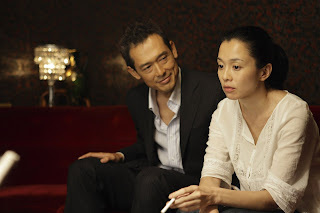
With Tokyo Sonata, Kurosawa Kiyoshi makes something entirely different than the films he has made before. His latest film is an ode to the old Japanese master Yasujiro Ozu who made films between 1920-1960 in Japan. As with most Ozu pictures, the film centers around a family living in Tokyo, there's the conflicts between generations, with the sympathy for the younger, and the social comment on the salaryman's life. The second film being highly influenced by by the late filmmaker, contemporary filmmakers in Japan seem to become more interested in Japan's rich film history.
The father and husband of the family, Ryuhei, loses his job but is too ashamed to tell his family. He pretends he is still going to work and later finds out he's not the only person who has a fake job. In the park where people without a job get food, he finds many people in business outfit. When he has a job interview, he realizes he could only function well in the company he worked all his life. Because he's 46 year old and has no special qualities. When the man who holds the interview asks him what he is good at, Ryuhei, unable to answer the man, tells him he is good at karaoke. Later Ryuhei picks up a job as a cleaner.
In the meantime, Ryuhei's oldest son, Takashi wants to join the American forces. He thinks he can bring peace to Iraq. His father disapproves, but he will go anyway. His younger brother Kenji wants to play piano but isn't allowed to. He uses his lunch money to take lessons and is convinced by his piano teacher to go to do an audition at a special music school. The mother, Megumi, finds out about Ryuhei, but decides not to tell him. She mostly stands on the sideline but supports her children as much as possible. She thinks about leaving her husband, but decides to stay.
The part about the man who loses his job and fakes he is still going to work may sound like a documentary for Japanese people, because it happens a lot there, and most people are aware of it. If the film had been made in the States, it would probably have been a comedy. While there is enough absurdism in Tokyo Sonata to make a good comedy, Kurosawa is deadly serious. It's a frightening idea that you can lose your job anytime and lose everything you've build up. It's the main reason people settle down at such a young age in Japan. Security is everything, and you better make up your mind when you're in your 20s. But Kurosawa shows us how unreasonable it is, and something has to change in his country.
While Ryuhei's storyline may be the strongest of the film, Takashi's part is not worked out well at all. It seems the character is made up for the sake of making a statement about the war in Iraq. While I agree with Kurosawa, the character adds nothing to the film and should have been left out.
The younger boy, Kenji shows similarities with the boys of Ozu's I Was Born, But... He hates most adults and has conflict after conflict with them. His dad doesn't allow him to play piano, but when he asks his dad what he does every day and why he's never home, Ryuhei has no answer. One of the last sequences in the film where Ryuhei plays the piano is one the most emotional because someone finally listens to him.
The mother, Megumi, only has her dramatic scenes at the end of the film. The actor Yakusho Koji, who's known for roles in films like Babel, Eureka, or Kurosawa Kiyoshi's older films, suddenly shows up as a burglar and kidnaps her. This part of the film is not very convincing, because it feels forced, and put in for the mere sake of drama or character development of the mother, to show how she feels.
Tokyo Sonata is a flawed masterpiece. For a greater understanding of Japanese modern society it's of great value for the western viewer. But it's just as important for Japanese people to have an objective view of their own society. Even if they already know how the system. Tokyo Sonata allows you to look inside the life of an ordinary Japanese family. The film is more sentimental than an Ozu film but it's content makes it one of the best films that played during the IFFR 2009.
****1/2(out of 5)



















